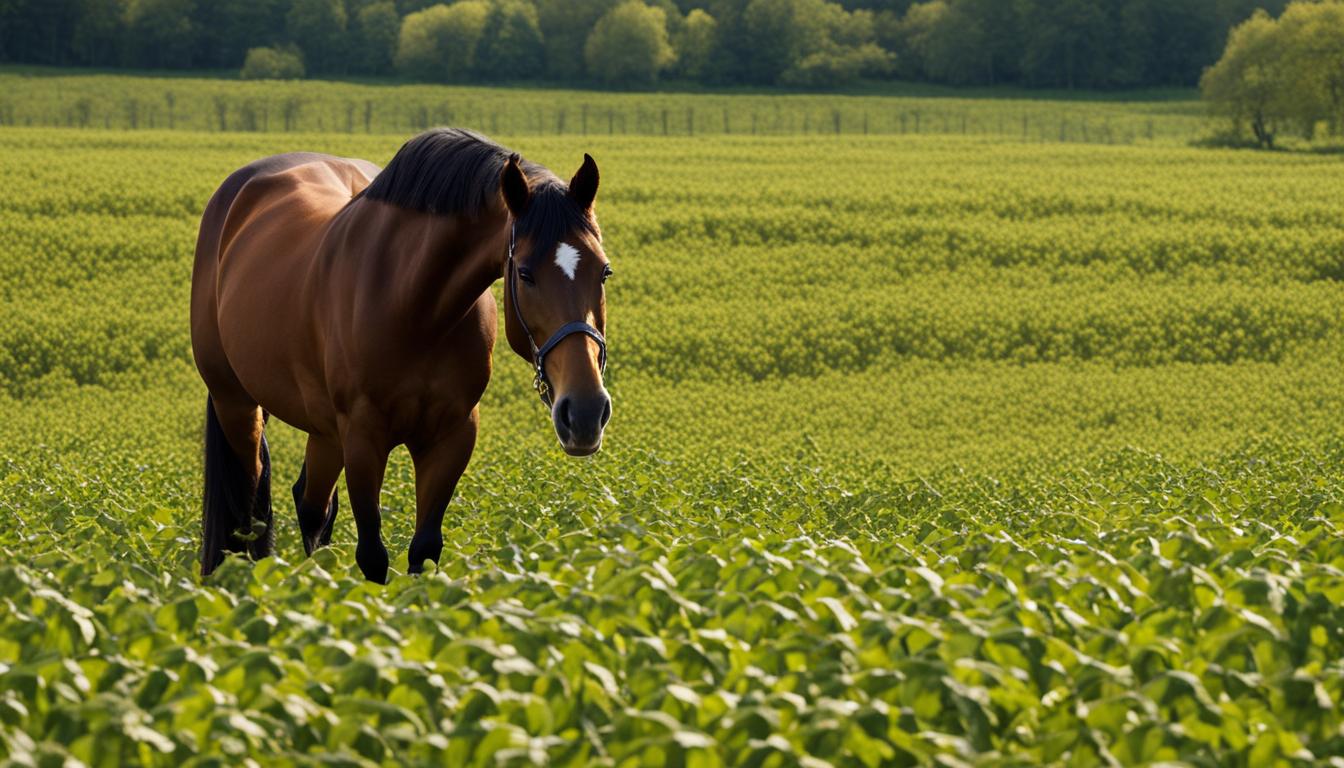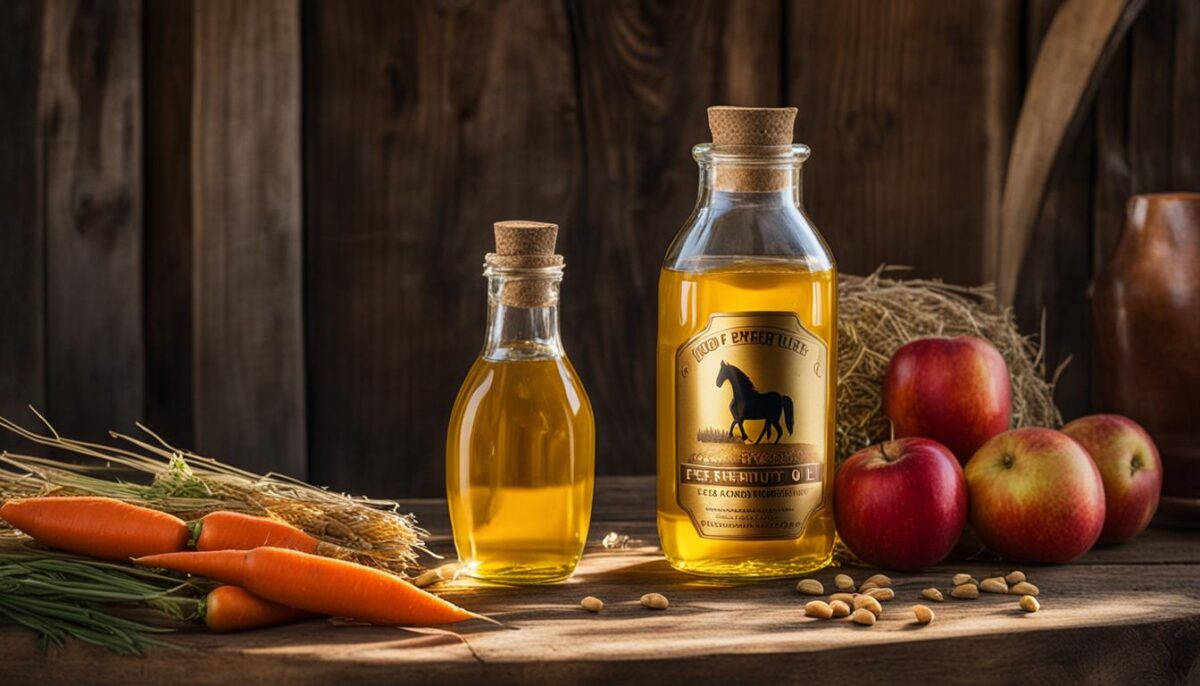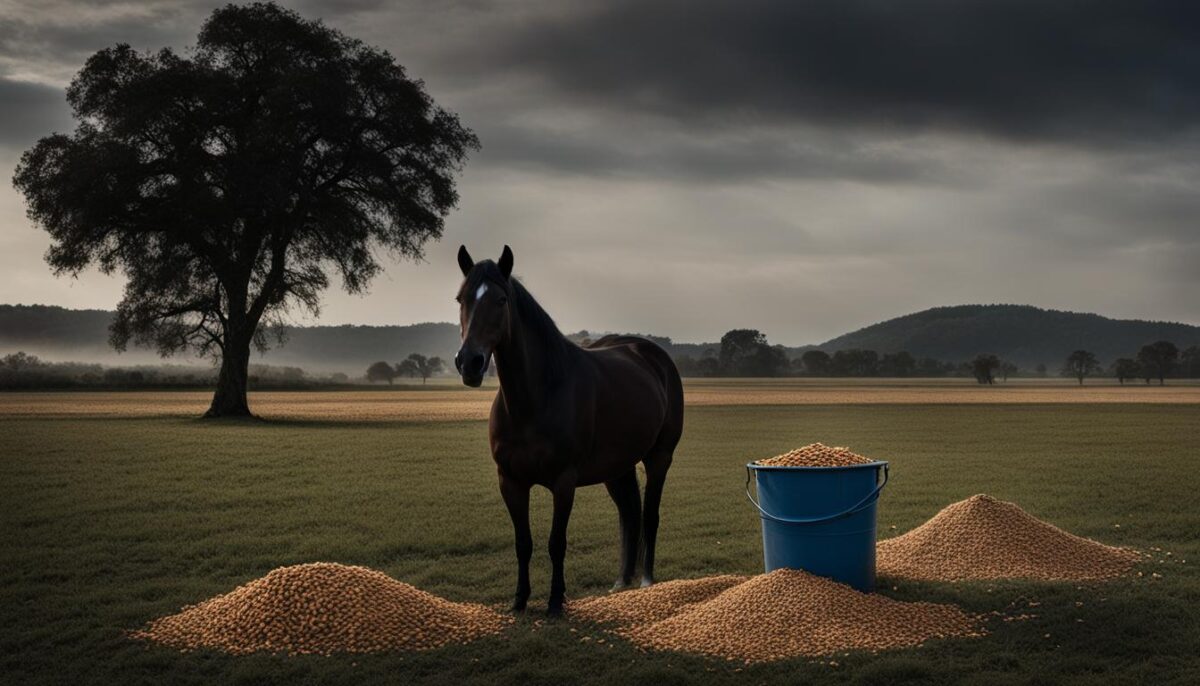Are you curious about whether horses can eat peanuts? In this article, we will delve into the nutritional facts surrounding peanuts and their suitability for equine-friendly diets. Let’s explore the ins and outs of peanuts and their potential impact on your beloved horse’s health.
Key Takeaways:
- Peanuts and their by-products are not commonly used in high-quality horse feeds.
- Peanut hulls, often considered filler, have low nutritional value, high fiber content, and potential aflatoxin contamination.
- Peanut oil is not commonly used in equine diets but can provide nutritional benefits.
- Peanut hay, a legume forage, is highly palatable to horses and can be included in moderation.
- Consult with a professional equine nutritionist for the best approach to incorporating peanuts into your horse’s diet.
Peanut Hulls in Horse Feeds
Peanut hulls, the shells left after peanuts are harvested and cleaned, have been studied as an ingredient in horse feeds. However, they have low levels of protein, fat, and minerals, and almost no vitamins. While the fiber content of peanut hulls is high, most of it is indigestible lignin. The high lignin content makes peanut hulls less nutritious compared to hay.
Equine nutritionists and reputable feed manufacturers consider peanut hulls to be fillers and do not recommend their use in horse feeds. Additionally, peanut hulls have the potential to be contaminated with aflatoxins, which can be toxic to horses.
Comparison of Fiber Content in Peanut Hulls and Hay
| Peanut Hulls | Hay |
|---|---|
| High fiber content | Moderate fiber content |
| Mostly indigestible lignin | Easier to digest fiber |
| Less nutritious | More nutritious |
As shown in the table, peanut hulls contain a higher amount of fiber, but the majority of it is indigestible lignin. This makes them less nutritious compared to hay, which has a more easily digestible fiber content.
It is crucial to prioritize the well-being of horses by opting for horse feeds that are free from fillers like peanut hulls and manufactured by reputable brands. This ensures the safety and quality of the feeds, reducing the risk of potential aflatoxin contamination.
Peanut Oil in the Equine Market
When it comes to the equine market, peanut oil is not as commonly used as other vegetable oils. Peanut oil, derived from peanuts, is widely used in cooking due to its ability to withstand high frying temperatures. However, its higher cost compared to other vegetable oils has limited its popularity in the equine market.
Despite its limited use, there is no reason to believe that horses couldn’t benefit from peanut oil. Like other liquid fats, peanut oil can provide nutritional benefits to horses. Liquid fats are a source of energy and can enhance the palatability and digestibility of feeds.
While peanut oil may not be commonly used in equine diets, it can still be considered as a supplement to provide additional nutritional benefits to horses. However, it is important to consult with a professional equine nutritionist before incorporating peanut oil into a horse’s diet to ensure that it is done in the right amount and in the most appropriate way.
In summary, peanut oil has not gained much traction in the equine market, but it does offer potential nutritional benefits to horses. Its higher cost compared to other vegetable oils may be a limiting factor in its use. Ultimately, it is recommended to consult with experts to determine the best course of action when considering peanut oil as part of a horse’s diet.
Benefits of Peanut Oil in the Equine Diet
Peanut oil, like other liquid fats, can offer several benefits when included in a horse’s diet:
- Source of energy: Liquid fats provide horses with a concentrated source of energy, which can be especially beneficial for high-performance horses or those in need of additional calories.
- Promotes palatability: The addition of peanut oil can enhance the taste and palatability of feeds, encouraging horses to consume their meals with enthusiasm.
- Enhances digestibility: Liquid fats can improve the digestibility of feeds, allowing horses to better absorb and utilize essential nutrients.
- Provides essential fatty acids: Peanut oil is rich in omega-6 fatty acids, which play a crucial role in various physiological processes, including inflammation regulation and immune system function.
While peanut oil may have its benefits, it is important to remember that moderation is key. It is always recommended to consult with an equine nutritionist before making any significant changes to a horse’s diet.
Peanut Hay as Forage
Peanut hay is a special type of forage that is derived from the peanut plant. It is classified as a legume, similar to other plants like alfalfa and clover. Peanut hay is known for its high palatability, meaning that horses find it tasty and enjoy eating it. Despite its slightly brownish or yellowish appearance, peanut hay is nutritious for horses and they do not seem to mind its color.
Peanut hay has larger leaves compared to alfalfa, which helps to reduce the problem of leaf shatter. This means that the leaves of peanut hay are less likely to break apart and be wasted during feeding. Horses can benefit from the larger leaves as they provide more nutrients and contribute to the overall nutritive value of the hay.
When feeding peanut hay to horses, it is important to do so in moderation. The high palatability of peanut hay may lead horses to overconsume if not carefully managed. To ensure that the horse’s nutritional needs are met, it is recommended to consult with a professional equine nutritionist. They can provide guidance on the appropriate amount of peanut hay to incorporate into the horse’s diet.
Table: Nutritional Comparison of Peanut Hay and Alfalfa (per 1 lb)
| Nutrients | Peanut Hay | Alfalfa |
|---|---|---|
| Protein | 15% | 18% |
| Fiber | 30% | 32% |
| Fat | 2% | 2% |
| Vitamins | Contains vitamin A, B, and E | Contains vitamin A, B, and E |
| Minerals | Contains calcium, phosphorus, and potassium | Contains calcium, phosphorus, and potassium |
Peanut hay is a nutritious and palatable forage option for horses. Its larger leaves and high palatability make it a valuable addition to equine diets. However, it is important to feed peanut hay in moderation to prevent overconsumption. Consulting with an equine nutritionist can help ensure that the horse’s nutritional needs are met while incorporating peanut hay into their diet.
Nutritional Analysis of Peanut Hulls
When it comes to understanding the nutritional value of peanut hulls, it’s important to examine their composition. Peanut hulls have low levels of protein, fat, and minerals. In fact, they contain virtually no vitamins. However, they do have a high fiber content. The fiber in peanut hulls is crucial for a horse’s digestive health, but it’s important to note that a significant portion of this fiber is indigestible lignin.
Lignin is a component of plant cell walls that provides structural support. While it’s an essential part of a plant’s structure, it is indigestible for horses. In the case of peanut hulls, the lignin content is significantly higher compared to hay, making them less nutritious. On average, peanut hulls contain about 22-24% lignin, while hay usually has less than 10% lignin content. This high lignin content makes peanut hulls less desirable as a source of fiber compared to other alternatives.
The Role of Fiber
Fiber plays a crucial role in a horse’s diet as it aids in maintaining a healthy digestive system. It helps regulate bowel movements and supports the growth of beneficial gut bacteria. While the high fiber content in peanut hulls is beneficial, the prominence of lignin makes them less ideal compared to other sources of fiber, such as hay or certain types of grasses.
| Nutrient | Average Content in Peanut Hulls |
|---|---|
| Protein | Low |
| Fat | Low |
| Minerals | Low |
| Vitamins | Virtually None |
| Fiber | High |
| Lignin | Significantly higher than hay |
Although fiber is an essential component of a horse’s diet, the high lignin content in peanut hulls makes them less desirable compared to other sources of fiber. It is important to incorporate a balanced diet that includes a variety of fiber sources to support your horse’s overall health and well-being.
Next, we’ll take a closer look at the potential risks associated with using peanut hulls in horse feeds.
Potential Risks of Peanut Hulls in Horse Feeds
When it comes to incorporating peanut hulls into horse feeds, there are potential risks that you should be aware of. Apart from being nutritionally inadequate, peanut hulls may be contaminated with aflatoxins, which are poisonous to horses. Aflatoxins are produced by certain molds that can grow on peanuts, especially if they are stored in warm and humid conditions.
“Peanut hulls in horse feeds can pose health risks to horses due to potential aflatoxin contamination. Aflatoxins are toxins produced by mold that can grow on peanuts. Horses are particularly sensitive to aflatoxins, which can be harmful or even fatal to them.”
It’s important to note that reputable feed manufacturers prioritize the safety and quality of their products. They avoid using fillers of any kind, including peanut hulls, to minimize the potential risks associated with aflatoxin contamination. By choosing horse feeds from reputable manufacturers, you can trust that the well-being of your horse is being prioritized.
To summarize, when considering peanut hulls in horse feeds, it’s crucial to be aware of the potential risks they present. Reputable feed manufacturers take precautions to ensure their products are safe for consumption. By making informed choices and selecting feeds from reputable manufacturers, you can help safeguard the health of your horse.
| Potential Risks of Peanut Hulls in Horse Feeds | Precautions to Take |
|---|---|
| Nutritional inadequacy | Choose horse feeds that have a balanced nutritional profile, avoiding fillers like peanut hulls. |
| Aflatoxin contamination | Ensure the horse feed comes from a reputable manufacturer that tests for aflatoxins and prioritizes safety. |
Peanut Oil and its Benefits
While peanut oil is not commonly used in the equine market, there is no reason to believe that horses couldn’t benefit from it. Peanut oil, like other liquid fats, can provide nutritional benefits to horses. Liquid fats are a source of energy and can enhance the palatability and digestibility of feeds. Although peanut oil may be more expensive compared to other vegetable oils, it can be considered as a supplement to provide additional nutritional benefits to horses.
When used in moderation, peanut oil can offer several advantages for horses in their diet:
- Promotes Healthy Coat and Skin: Peanut oil is rich in omega-6 fatty acids, which are essential for maintaining a healthy coat and skin. These fatty acids help to moisturize the skin, reduce inflammation, and prevent dryness and itchiness.
- Enhances Digestion and Absorption: The presence of healthy fats in peanut oil aids in the digestion and absorption of fat-soluble vitamins. It can improve the utilization of essential nutrients, leading to better overall health.
- Provides a Source of Energy: Liquid fats, including peanut oil, are a concentrated source of energy. By incorporating peanut oil into a horse’s diet, you can ensure that they receive the necessary fuel for endurance, performance, and maintaining optimal weight.
It’s important to note that while peanut oil can offer benefits to horses, it should be used in moderation and as part of a balanced equine diet. Consult with a professional equine nutritionist to determine the appropriate amount of peanut oil to include in your horse’s feeding regimen.
Peanut Oil: Nutritional Composition
Here is a breakdown of the nutritional composition of peanut oil:
| Nutrient | Amount per 100g |
|---|---|
| Calories | 884 |
| Total Fat | 100g |
| Saturated Fat | 17g |
| Monounsaturated Fat | 46g |
| Polyunsaturated Fat | 32g |
| Omega-3 Fatty Acids | 0.1g |
| Omega-6 Fatty Acids | 31g |
| Vitamin E | 15mg |
Conclusion
In conclusion, horses can eat peanuts, but it’s crucial to consider the nutritional facts and potential risks associated with different peanut products.
Peanut hulls, although high in fiber, are not nutritionally ideal for horses due to their low protein, fat, and mineral content. Additionally, peanut hulls often contain indigestible lignin and may be contaminated with aflatoxins, which are harmful to horses.
On the other hand, peanut oil can provide nutritional benefits to horses as a source of energy. However, it is not commonly used in the equine market due to its higher cost compared to other vegetable oils.
When it comes to forage, peanut hay is a highly palatable option for horses. Despite its brownish or yellowish appearance, peanut hay is nutritious and can be incorporated into a horse’s diet in moderation.
To ensure the appropriate use of peanut products in a horse’s diet, it is essential to consult with a professional equine nutritionist who can provide expert guidance based on your horse’s specific needs.
FAQ
Can horses eat peanuts?
Yes, horses can eat peanuts. However, it is important to consider the nutritional facts and potential risks associated with different peanut products.
What are the nutritional facts about peanut hulls in horse feeds?
Peanut hulls contain low levels of protein, fat, and minerals, as well as virtually no vitamins. The high lignin content in peanut hulls makes them less nutritious compared to hay.
Are peanut hulls considered a filler in horse feeds?
Yes, peanut hulls are considered fillers by equine nutritionists and reputable feed manufacturers due to their low nutritional value and high lignin content.
Are there potential risks associated with peanut hulls in horse feeds?
Yes, peanut hulls may be contaminated with aflatoxins, which can be toxic to horses. It is important to choose horse feeds from trusted manufacturers to ensure the safety and quality of the products.
Is peanut oil commonly used in the equine market?
No, peanut oil is not commonly used in the equine market due to its higher cost compared to other vegetable oils. However, it can provide nutritional benefits to horses.
Can peanut oil provide benefits to horses?
Yes, peanut oil, like other liquid fats, can provide nutritional benefits to horses as a source of energy. It can enhance the palatability and digestibility of feeds.
What is peanut hay and how is it used as forage?
Peanut hay is a legume forage that is highly palatable to horses. It can be incorporated into their diets in moderation and is used as an alternative forage source.
What are the nutritional benefits of peanut hay?
Peanut hay, although brownish or yellowish in appearance, is nutritious and has higher palatability for horses. It is rich in nutrients and can provide a good source of forage.
Are there potential risks associated with peanut hulls in horse feeds?
Yes, peanut hulls may be contaminated with aflatoxins, which can be poisonous to horses. It is important to choose horse feeds from trusted manufacturers to ensure the safety and quality of the products.
What is the conclusion regarding horses eating peanuts?
In conclusion, horses can eat peanuts, but it is important to consider the nutritional facts and potential risks associated with different peanut products. Peanut hulls are not nutritionally ideal for horses and are often considered fillers. Peanut oil can provide benefits to horses as a source of energy. Peanut hay is a nutritious forage option, but should be fed in moderation. Consult with a professional equine nutritionist for appropriate use of peanut products in a horse’s diet.


